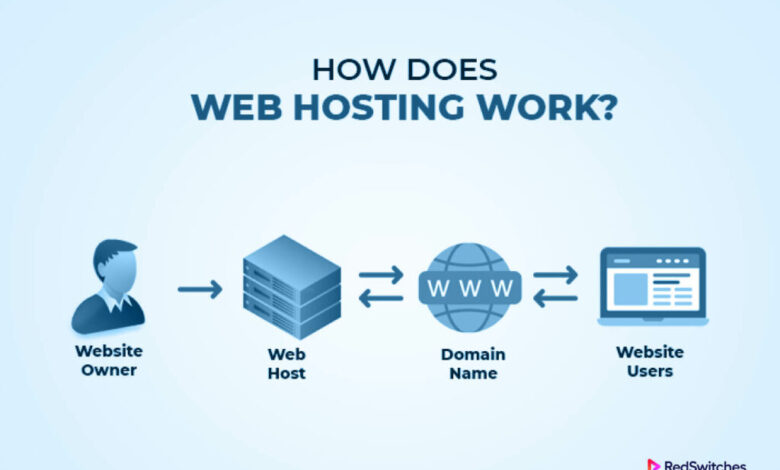The Complete Guide to Web Hosting

The Complete Guide to Web Hosting. Varieties, Attributes, and Best Practices. Entering the realm of hosting signifies embarking on the journey of website creation. You’ve likely encountered the term “hosting,” but what exactly does it entail, and why is it indispensable in the digital sphere? Let’s delve into it.
Understanding Hosting:
Hosting is essentially the service enabling your website’s presence on the internet. Picture it as leasing space in the virtual realm where your website’s files and data reside. When individuals input your website’s URL into their browsers, this space delivers your site’s content to their screens.
Significance of Hosting in the Digital Era:
In today’s digital milieu, establishing a robust online presence is imperative for businesses and individuals alike. Hosting plays a pivotal role by ensuring your website is accessible, secure, and swift. Quality hosting can elevate user experience, bolster search engine rankings, and impact your site’s overall performance and reliability.
Varieties of Hosting:
Several hosting options cater to diverse needs and budgets, each with its nuances.
Shared Hosting:
Shared hosting resembles living in an apartment complex where you share resources like CPU, RAM, and bandwidth with other websites on the same server.
Virtual Private Server (VPS) Hosting:
VPS hosting strikes a balance between shared and dedicated hosting. While you share a server, dedicated resources are allocated to your site.
Dedicated Hosting:
Dedicated hosting grants you an entire server exclusively for your website, akin to owning a house without resource sharing.
Cloud Hosting:
Cloud hosting utilizes a network of servers for hosting, offering high flexibility and reliability.
Managed Hosting:
Managed hosting entails additional services like maintenance, security, backups, and support, freeing you from technical intricacies.
Selecting the Right Hosting for Your Needs:
Choosing the appropriate hosting entails several considerations to ensure it aligns with your specific requirements.
Evaluating Your Website’s Needs:
Take into account your website’s purpose, anticipated traffic, and resource requirements.
Budgetary Considerations:
Determine your investment threshold without compromising on crucial features like uptime, speed, and security.
Scalability and Future Expansion:
Opt for a host capable of accommodating your website’s growth in traffic and content.
Technical Support and Customer Service:
Reliable support can mitigate potential downtime and technical glitches. Seek providers renowned for exceptional customer service.
Leading Hosting Providers in 2024:
Several hosting providers stand out this year for their features, performance, and customer satisfaction.
Established Hosting Companies:
Names like Bluehost, SiteGround, and HostGator have cemented their positions as industry leaders.
Key Features and Pricing:
These providers offer varying features and pricing structures tailored to different needs and budgets.
Customer Reviews and Reputation:
Gauging customer feedback can offer insights into the real-world performance and reliability of these providers.
Setting Up Your Hosting:
While setting up hosting may seem daunting, it’s manageable with the right steps.
Registering a Domain Name:
Your domain serves as your website’s internet address, reflecting your brand and ensuring memorability.
Choosing a Hosting Plan:
Select a plan based on your requirements and budget, balancing resources and features.
Configuring Your Hosting Account:
Follow the provider’s setup process, typically involving account creation, plan selection, and configuration.
Installing a Content Management System (CMS):
Most hosting providers facilitate one-click installations for popular CMSs like WordPress, streamlining website setup.
Security in Hosting:
Security is paramount in hosting, safeguarding your website and data against threats.
Significance of Security Measures:
Investing in robust security measures is crucial to prevent data loss, downtime, and damage to your reputation.
Common Security Features:
Look for features like SSL certificates, firewalls, regular backups, and malware scanning.
Best Practices for Website Security:
Adhere to practices like regular software updates, strong password usage, and consistent data backups.
Optimizing Performance in Hosting:
Website speed is pivotal for user experience and SEO.
Importance of Speed:
Swift websites enhance user satisfaction and can positively impact search engine rankings.
Tools and Techniques for Performance Enhancement:
Utilize tools like Google PageSpeed Insights to identify and rectify speed issues. Employ image optimization, caching, and consider a Content Delivery Network (CDN).
Hosting’s Impact on SEO:
Quality hosting ensures high uptime and rapid load times, factors contributing to improved SEO rankings.
Addressing Common Hosting Issues:
Even with top-tier hosting, challenges may arise.
Downtime and Uptime:
Seek hosts guaranteeing minimal downtime, preferably at least 99.9% uptime.
Bandwidth Limitations:
Monitor bandwidth usage to prevent site slowdowns or outages due to exceeding limits.
Server Errors and Remedies:
Common errors like 500 Internal Server Error or 404 Not Found can be resolved with provider support.
Migrating Your Website:
Occasionally, migrating to a new host becomes necessary for enhanced performance or support.
Reasons for Migration:
Factors like subpar performance, high costs, or inadequate support prompt migration.
Migration Steps:
Back up your site, select a new host, and adhere to their migration guidelines for a seamless transition.
Post-Migration Checklist:
After migration, rigorously test your site, update DNS settings, and inform your users.
The Future of Hosting:
The hosting landscape continues evolving with emerging technologies and trends.
Innovative Technologies:
Technologies like AI, machine learning, and edge computing are shaping hosting’s future.
Trends on the Horizon:
Anticipate a focus on eco-friendly hosting, augmented security features, and increased cloud-based solutions.
Conclusion:
Hosting serves as the backbone of your online presence. By comprehending the hosting varieties and essential considerations, you can select a solution aligning with your needs. Whether launching a blog or managing an e-commerce site, the right hosting choice can significantly impact your online venture.
FAQs:
Distinguishing Shared and Dedicated Hosting:
Shared hosting involves sharing server resources, while dedicated hosting provides exclusive server access.
Enhancing Website Speed:
Optimize images, implement caching, and consider a CDN for speed optimization.
Suitability of Cloud Hosting for Small Businesses:
Yes, cloud hosting’s scalability makes it suitable for small businesses.
Criteria for Evaluating Customer Service:
Look for 24/7 support availability, multiple contact methods, and positive customer feedback on support experiences.
Data Preservation During Host Migration:
With proper backups and adherence to migration steps, you can switch hosts without data loss.




